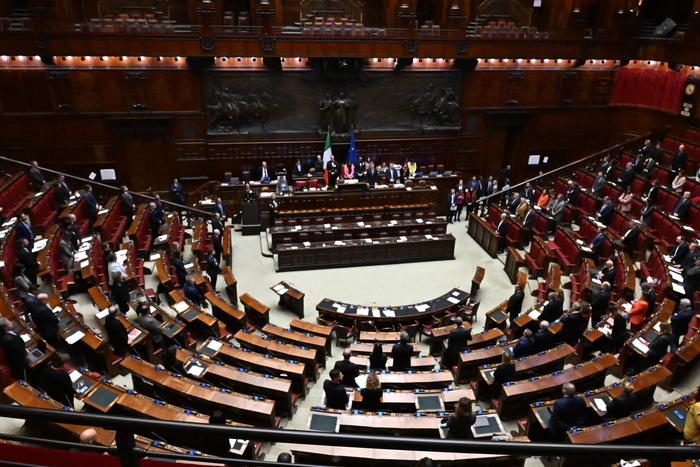Icon: enlarge
Demonstrators in front of the verdict of the Brandenburg Constitutional Court on the parity law
Photo: Soeren Stache / dpa
At the end of this year the German Women's Council and the State Women's Council wrote a letter to the democratic parties.
The letter asked what politicians intend to do to get more women into parliament in the next federal election.
It went to all party leaders in the countries.
The addressees were chosen carefully.
Because when it comes to getting more women in politics, it is now the parties that count.
The proportion of women in the Bundestag fell to a 20-year low after the 2017 election: only 31 percent of the MPs in this legislative period are women.
The most recent elections have reduced the proportion of women in the state parliaments almost everywhere.
And in the 2020 corona year, the lack of influence of women politicians on important decisions was repeatedly complained.
If that is to change, 2021 offers the parties ample opportunity.
Then there are six state elections and the federal election.
The list will begin soon.
In 2019, the women's lobby was still optimistic.
For the 100th anniversary of women's suffrage, several state governments had discussed parity laws.
The state governments in Brandenburg and Thuringia stipulated an equal number of electoral lists with two election amendment laws.
An interparliamentary women's group met in the Bundestag and looked for similar solutions at the federal level.
At the end of the year this group was hopelessly divided.
In 2020, the two parity laws were overturned again by the state constitutional courts after complaints from the AfD and NPD.
The reason given was that the laws were essentially incompatible with the principle of freedom and equality of choice.
An electoral reform at the federal level, which provided for a parity regulation, did not materialize due to opposition from the Union.
Instead, a commission is now to work out how more women can get into parliament.
However, this commission has not yet been set up.
And now?
Thuringia wants to change the state constitution
In Thuringia, the red-red-green government does not want to resign itself to the judicially overturned law.
She aims to change the state constitution.
In essence, it is about the passage to enforce equality between men and women.
In order to safeguard a parity law, such a regulation would have to be mentioned explicitly.
This is what the French government did years ago.
Following a constitutional amendment, a parity law now applies there.
This should also work in Thuringia by March, says Karola Stange, member of the state parliament of the Left and chairwoman of the Equal Opportunities Committee.
Red-Red-Green are working on an agreement with the CDU on the subject.
If the government comes into being again in the state elections in April, it wants to make a new attempt and pass a parity law that will last.
Rod is not enough.
"Only an equal list of the state lists is window dressing," she says.
Actually, they ought to be talking about quoting direct mandates.
After all, the CDU still moves into parliaments primarily through direct mandates - and these are still mostly given to men.
They also want to exhaust all possibilities in court: the representative of the Thuringian government has therefore lodged complaints with the Federal Constitutional Court on behalf of 500 people.
The representative of the Brandenburg government did not consider such an approach to be promising.
In the meantime, however, a civil alliance has filed a complaint with the Federal Constitutional Court against the Brandenburg decision.
It is still open whether Karlsruhe will deal with both cases.
Berlin continues to work on the parity law
The government in Berlin was not deterred by the rulings from Thuringia and Brandenburg: It wants to stick to its project and pass a parity law in this legislative period.
The parliamentary group of the Left presented a draft law in 2019.
The Greens parliamentary group also presented key points in March 2020.
Both parliamentary groups not only want to halve quoted lists, but also the constituencies in Berlin, in order to enable direct candidate duos of men and women.
Clarification is only needed with the SPD.
The SPD parliamentary group also wants to present a proposal at the beginning of 2021.
The parliamentary group is looking for a solution that differs significantly from the election amendment laws from Brandenburg and Thuringia.
For the next state election, however, a law will not yet apply - if it is passed.
There are also demands for parity laws in other countries; only a few projects are concrete.
In North Rhine-Westphalia, the SPD and the Greens introduced a bill into the state parliament in 2019, which was already discussed in the first reading.
But he doesn't have much chance of success.
Because CDU, FDP and AfD are against a parity law.
It is therefore unlikely that there will be parity laws soon.
If anything, change must come from the parties.
In the past elections, for example, the CDU in Saxony voluntarily quoted its first place on the list.
That was little more than a nice gesture, however.
After all, the Union is primarily winning direct mandates.
The state elections in Saxony-Anhalt should therefore be particularly informative: A legal opinion here came to the conclusion that a parity law at state or municipal level is not possible without a constitutional amendment.
The federal state has the lowest proportion of women parliamentarians in Germany: 21.8 percent.
Icon: The mirror




/cloudfront-eu-central-1.images.arcpublishing.com/prisa/NXAN6ORR7JECNIMY7N6WRPH3XA.jpg)




/cloudfront-eu-central-1.images.arcpublishing.com/prisa/6YOQKRNM2VFEDJ77EV4BG7TTOQ.JPG)





